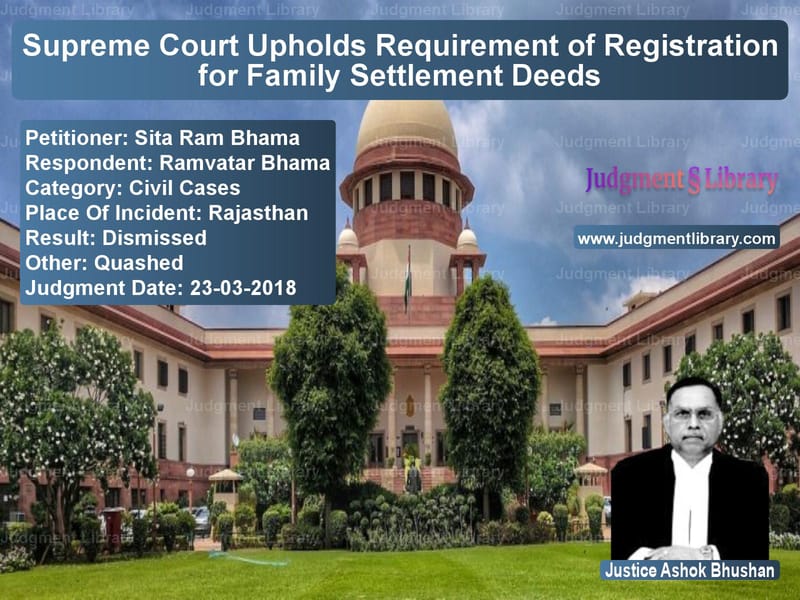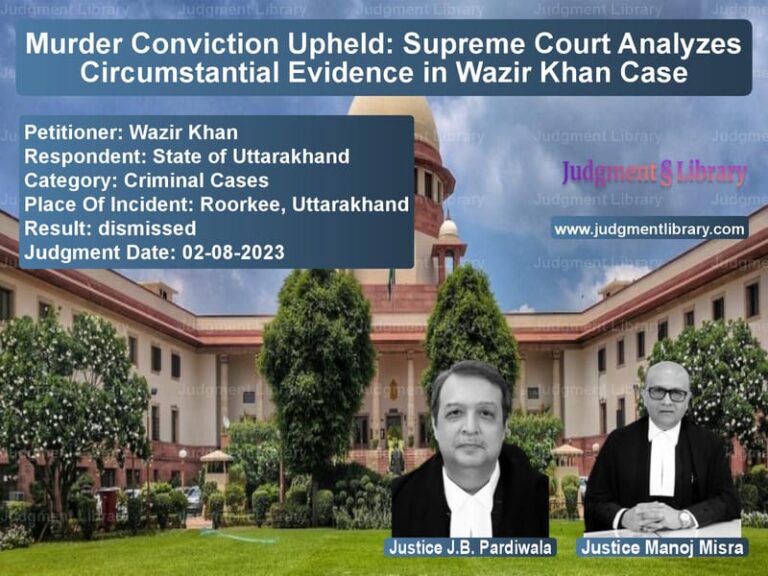Supreme Court Upholds Requirement of Registration for Family Settlement Deeds
The case of Sita Ram Bhama v. Ramvatar Bhama revolves around the legal validity of a family settlement deed and its requirement for registration under the Registration Act. The Supreme Court upheld the Rajasthan High Court’s ruling that the settlement deed executed by the parties was compulsorily registrable and could not be used as evidence without proper stamping and registration.
Background of the Case
The dispute arose between two brothers, Sita Ram Bhama and Ramvatar Bhama, regarding the division of their father’s self-acquired properties. Their father, Devi Dutt Verma, had allegedly decided to divide his properties between the two sons on October 25, 1992, but no formal settlement deed was executed at the time.
After Devi Dutt Verma passed away on September 10, 1993, a memorandum of settlement was recorded on September 9, 1994. This document was signed by the two brothers and witnessed by their mother and two sisters. It outlined the division of their father’s properties, including a residential house and a shop in Aguna Bazar.
Legal Proceedings Leading to Supreme Court
1. First Partition Suit (2010)
In 2010, the appellant (Sita Ram Bhama) filed a suit for partition, claiming a share in the properties. The defendant (Ramvatar Bhama) opposed the suit, arguing that the partition had already taken place as per their father’s wishes and was recorded in the family settlement of 1994. The defendant filed an application under Order VII Rule 11 CPC, contending that the suit was not maintainable due to the prior partition.
The trial court accepted the defendant’s plea and dismissed the partition suit on January 19, 2011, ruling that no cause of action existed since the properties had already been divided.
2. Second Suit for Possession (2011)
After the dismissal of the first suit, the appellant alleged that the defendant had forcibly taken possession of the house by breaking the lock. In 2011, he filed a fresh suit seeking possession of the property, a permanent injunction, and mesne profits.
During these proceedings, the appellant relied on the 1994 family settlement deed as evidence of the division of property. The defendant objected, arguing that the document was not duly stamped or registered and, therefore, could not be used as evidence.
3. Trial Court and High Court Rulings
The trial court ruled in favor of the defendant, holding that the 1994 settlement deed was a relinquishment document that required registration under Section 17 of the Registration Act. Since it was neither stamped nor registered, it was deemed inadmissible as evidence.
The Rajasthan High Court upheld this decision in 2017, leading to the present appeal before the Supreme Court.
Petitioner’s Arguments
The appellant, Sita Ram Bhama, argued that:
- The document dated September 9, 1994 was merely a memorandum of an earlier family settlement, and memorandums do not require registration.
- The partition had already been effected by their father in 1992, and the document was only meant to record what had already been decided.
- The trial court and the High Court had misinterpreted the document as a settlement deed rather than a memorandum.
- The principles laid down in Kale v. Deputy Director of Consolidation (1976) supported the validity of oral and written family settlements.
Respondent’s Arguments
The respondent, Ramvatar Bhama, contended that:
- The document in question was not a mere memorandum but an actual family settlement that divided the father’s self-acquired properties.
- The document included the relinquishment of shares by their mother and sisters, making it a deed that required compulsory registration under the Registration Act.
- The document also involved immovable property, which cannot be transferred or relinquished without proper registration.
- The trial court correctly applied the law and rejected the document as evidence.
Supreme Court’s Observations
1. Registration of Family Settlements
The Court referred to the ruling in Kale v. Deputy Director of Consolidation, which states that oral family settlements do not require registration. However, in the present case, the Court found that the document was not merely recording an oral settlement but was creating fresh rights.
“The document dated 09.09.1994 was not a mere memorandum but an instrument of partition and relinquishment, which required compulsory registration.”
2. Applicability of Section 17 of the Registration Act
The Court held that any document that creates, declares, assigns, limits, or extinguishes rights in immovable property must be registered.
“The document resulted in the relinquishment of rights by the mother and sisters in favor of the two brothers. Hence, it was compulsorily registrable under Section 17 of the Registration Act.”
3. Admissibility for Collateral Purposes
The Court acknowledged that unregistered documents could be used for collateral purposes but clarified:
“An unstamped instrument is not admissible in evidence even for collateral purposes unless impounded and proper stamp duty is paid.”
4. Trial Court’s Decision Upheld
The Supreme Court found no error in the trial court’s ruling and dismissed the appeal.
“The trial court was correct in rejecting the document as evidence. The appeal is dismissed.”
Supreme Court’s Final Verdict
The Supreme Court ruled as follows:
- The 1994 family settlement deed required compulsory registration under the Registration Act.
- Since the document was not registered or properly stamped, it was inadmissible as evidence.
- The document could not be used to prove partition or ownership of immovable property.
- The appeal was dismissed, and the High Court’s ruling was upheld.
Key Takeaways
- Family settlement deeds that create new rights or involve relinquishment of shares must be registered.
- Unregistered documents may be used for collateral purposes only if proper stamp duty is paid.
- Courts will not accept unregistered documents as proof of ownership or partition.
- The ruling reinforces the importance of following proper legal procedures in family property disputes.
Conclusion
The Supreme Court’s judgment in this case clarifies the legal position on family settlement deeds and their registration requirements. By dismissing the appeal, the Court has reinforced the principle that property transactions must be properly documented and registered to be legally enforceable.
Petitioner Name: Sita Ram BhamaRespondent Name: Ramvatar BhamaJudgment By: Justice Ashok BhushanPlace Of Incident: RajasthanJudgment Date: 23-03-2018
Don’t miss out on the full details! Download the complete judgment in PDF format below and gain valuable insights instantly!
Download Judgment: Sita Ram Bhama vs Ramvatar Bhama Supreme Court of India Judgment Dated 23-03-2018.pdf
Direct Downlaod Judgment: Direct downlaod this Judgment
See all petitions in Property Disputes
See all petitions in Succession and Wills
See all petitions in Landlord-Tenant Disputes
See all petitions in Judgment by Ashok Bhushan
See all petitions in dismissed
See all petitions in Quashed
See all petitions in supreme court of India judgments March 2018
See all petitions in 2018 judgments
See all posts in Civil Cases Category
See all allowed petitions in Civil Cases Category
See all Dismissed petitions in Civil Cases Category
See all partially allowed petitions in Civil Cases Category







